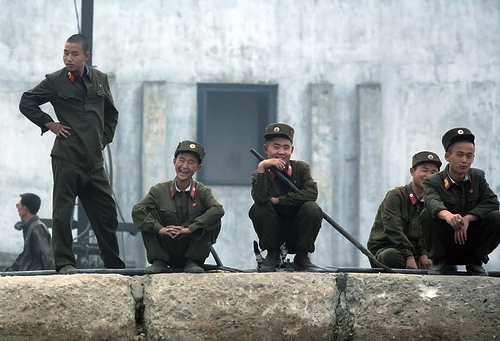![]()
The Words of the Robertson Family
|
|
The Words of the Robertson Family |

One of the subjects that interested me the most at university was North Korea. It interested me so much, that I decided to pursue my dissertation on the subject. It's a secretive regime, and nobody really knows what life is like on the other side of the DMZ. I recently watched a documentary on North Korea made by a Dutch film maker. Though I am deeply disturbed by the secrecy of North Korea with its hidden concentration camps, I didn't like the tone of the documentary, and the attitude of the documentary maker. It seemed as if his sole motive was to ridicule the country. I thought the Dutch were supposed to be open minded, yet they seem to be the most prejudiced of the lot of us! It's one thing to disapprove of certain practices in other countries, but to openly mock and ridicule seems pointless.
Anyway, the question I asked myself was how should the international community approach the issue of North Korea? There seemed to be two opposing points of view, as there always seem to be. The first was to have patience, supply them with humanitarian aid, engage in diplomatic talks, develop trade and business relationships, and promote tourism. This was known as the 'Sunshine Policy' deriving from the fable about the sun and the old man wearing the coat. Kim Dae Jung was a fierce advocate of this approach and successfully stayed true to this method for his term in office, even when Washington during the Bush administration was pushing for a more hard line approach. He even received a Noble Peace Prize for his efforts.
This approach did receive criticism though. Despite the good intentions, it was argued that this approach served only to prop up the North Korean regime and reward its bad behavior. I adamantly disagreed with these criticisms, believing a hard line approach could only anger Kim Jong Il and do nothing to improve the relationship between the two countries. Surely, North Korea was arming itself and developing its nuclear capacity in response to hostile American foreign policy and an aggressive Bush administration? This was the justification of the North Koreans at least.
But I came to realize that though part of the reason for this was due to the North Koreans feeling the need to defend themselves against a possible US invasion, it was also because they were able to in the first place. North Korea seemed to be abusing the trust and good will of the South Koreans under the administrations of Kim Dae Jung and Roh Moo Hyun. The tourism projects and the Kaesong Industrial Park were sources of much needed cash for the North Korean regime. It now seems a little naive to believe that they could actually soften the attitude of the North Koreans towards their southern neighbors. It's reported that North and South Korean workers on the industrial complex barely talk to each other anyway. Furthermore, diplomatic talks with the regime could only have been possible with under the table bribes and donations thanks to Hyundai who seem to be the largest financial investors in Korean peace efforts.
Lee Myung Bak, the current South Korean president, abandoned the Sunshine Policy when entering office in favor of a hard line approach. The relationship with North Korea has since become hostile, resulting in the expulsion of South Korean officials from the Kaesong Industrial Park and the continuation of North Korea's nuclear weapons program. North Korea labeled Lee Myung Bak as a traitor, an advocate of confrontation, and generally did a lot of kicking and screaming. I followed the news in dismay, having been a strong believer of the softer approach of cooperation and diplomacy.
But after really thinking about it, I realized the current regime as it stands in North Korea is so entrenched in its ideology that it will not change any time soon, especially if it is propped up through humanitarian aid and other such 'carrots'. If the outcome is the outright collapse of the regime, similar to the collapse of the Soviet Union, then with a little time and patience, perhaps the hard line approach would eventually force the North Koreans to the negotiating table. Lee Myung Bak, though he has been tough on North Korea, believes that aid should be given, but only on a conditional basis if North Korea agrees to dismantle its nuclear program.
It sounds harsh, but perhaps it is the only way. The Sunshine Policy was pursued with good intention, and it's unfortunate that the North Korean regime abused the trust of the South Koreans. Only time can tell, if this harder approach will bring substantial results.